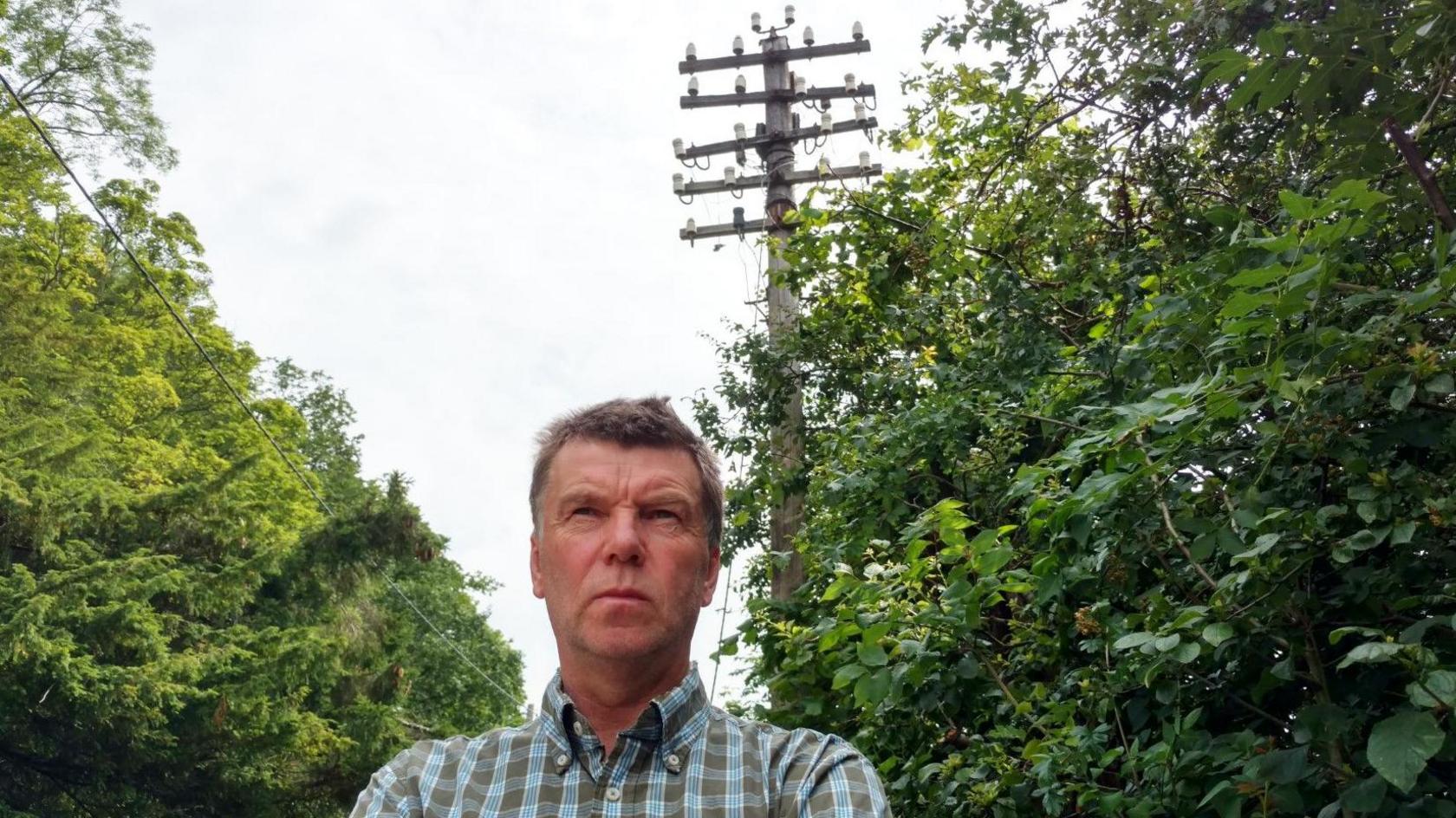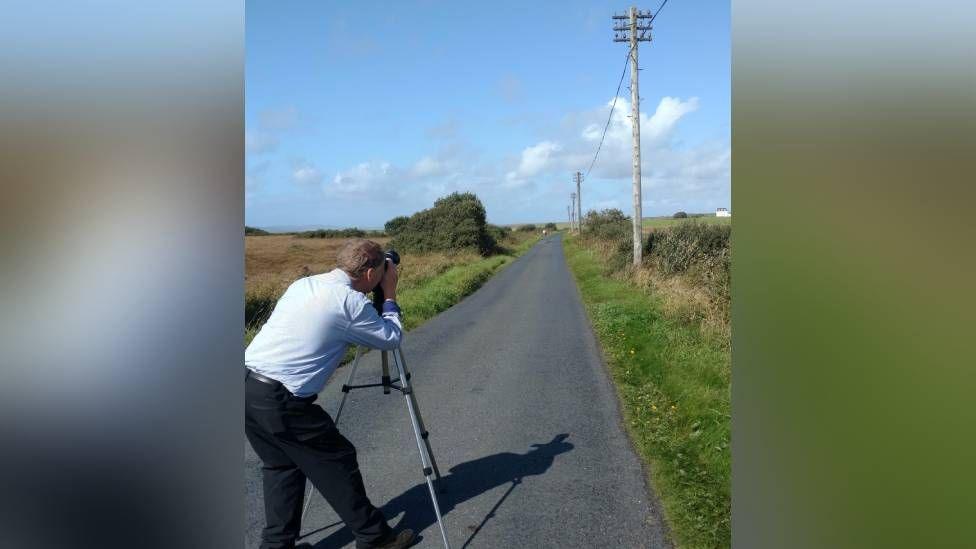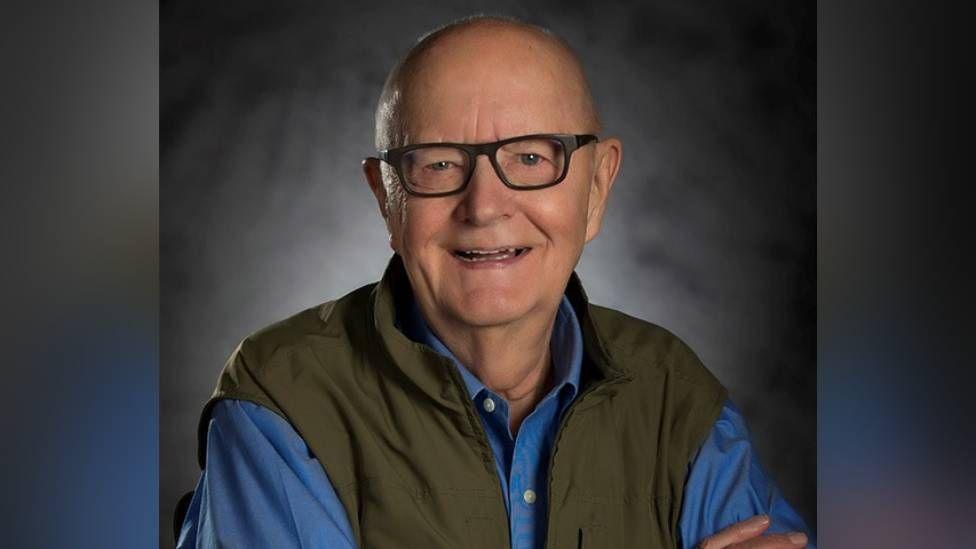The 'anti-influencers' honouring poles and benches

Martin Evans has a love of the aesthetic of telegraph poles
- Published
Ever since he was young Martin Evans has enjoyed looking at telegraph poles.
"It's the aesthetic of them, and the beauty of seeing them on the landscape," said the 63-year-old from near Tregaron, Ceredigion, adding he is "not interested in the technical details".
Such is his passion for them, today he oversees the thousand-plus-member Telegraph Pole Appreciation Society, which he admits is also a vehicle for his "whimsy" sense of humour.
The society is an extension of the Dull Men's Club (DMC), a decades-old community that has recently gained huge popularity online, which "celebrates the joys of everyday, ordinary and dull things".
Knitters' Olympics postbox toppers for home towns
- Published1 August 2024
Dull and Bland party far from Boring
- Published28 July 2017
"For us, it's jomo (joy of missing out), not fomo (fear of missing out)," says the DMC website.
Mr Evans established the telegraph pole society in 2000, and it now has about 1,300 "paid up" members.
"Our members range from extreme 'anoraks' to people who are just there to read my jokes," he said, adding that members receive a certificate, a pack of postcards and a copy of the society's book, Telegraph Pole Appreciation for Beginners (Key Stages 1 to 4).
"Telegraph poles that are different are a bit of a dying breed – a lot of them are very vanilla now," he said, when asked why it was important to document them.
DMC members have also established appreciation societies for things such as roundabouts, clouds and park benches.
Mr Evans said he has met many fellow DMC members over the years, some who have become close friends.
"They're not dull at all – they're quite whimsy I guess," he said.
He adds there is also something pleasant about sharing what might be considered "dull" past times with like-minded people.
"The internet can be a very toxic and sour place, so this is just a nice, gentle part of the internet for us to talk about something we enjoy," he said of both the appreciation society and the DMC.
Although he admits his society is "very much tongue in cheek", it has also given him and his fellow members a sense of community.
"We live in an age of turmoil and stress, and you're never going to get stressed reading my page," he said.

DMC members have started a number of appreciation societies, including one for telegraph poles
Paul Darby, 56, began following the DMC on Facebook after it kept showing up on his timeline with "things I was interested in – the things that are quiet and satisfying in life".
From Wiltshire, he recently posted on the group about his efforts to learn Welsh, because he used to holiday in north Wales when he was younger.
"I started to get interested in road signs and place names. Welsh names are very descriptive, and I wanted to learn a bit more about that," he said, adding he could now have basic conversations in Welsh.
Of interacting with the online group, he described posting on there as "cathartic", admitting there was also some ego involved in posting because he got such strong engagement.
His post about learning Welsh got more than 500 positive comments.
Mr Darby described the engagement as "well natured", and said the group did not have some of the "nastiness" you can find on other groups on social media.
"I would say it's very wholesome and gently amusing – it's sort of an anti-influencer movement," he said.

The Dull Men's Club is the brainchild of Grover Click, who founded it in New York City in the 1980s
The DMC was established in New York City in the 1980s by Grover Click, who is proud of the group's "friendly, cosy and safe part of the internet".
"We're against this thing called 'moreitis' – people constantly pushing to do more and more. We want to enjoy life today and resist all these pressures to do bigger, greater and grander things," he said.
The idea for the club came when Mr Click was sitting with friends at the bar of the New York Athletic Club (NYAC) – a private club founded in 1868 that overlooks Central Park - reading its monthly magazine that promoted "manly" sports like boxing, judo and wrestling.
"We were chatting and said we don't do any of those things, so maybe we're quite dull," he said.
"So why don't we start our own club? So that's how it started. It was very humorous, very tongue in cheek."
The club's first activity was to test which of the NYAC's six lifts was the quickest.
Mr Click then moved to the UK for work and kept the club going, and said a few years ago the Facebook group "just took off".
It now has more than 1.5 million members, and dozens of daily posts on topics ranging from the best fillings to put in sandwiches to a debate around where the longest corridor in the UK is.
Posters have started including a picture of bananas in their post, as well as their shoe size, and Mr Click said he does not know how it started but "people seem to enjoy it".
So with millions or committed members and annual merchandise, is it fair to say he has started a movement?
"Oh no. We prefer to stay put," he said.